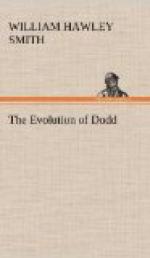That is not just the way the preacher said this, but it is substantially the idea that he tried to convey to the Lord, and perhaps he succeeded in doing so better than I have succeeded in conveying it to you, dear reader; but then, he had this advantage: The Lord is quicker at taking a point hinted at than the public is! Though this needs to be added: that if the Hearer of Prayer did catch the meaning that lay around loose somewhere in the jumble of the parson’s petition, that morning, He did not see fit to grant the request, for no scrap of a rag that ever had graced the backs of those dear old hymn-makers fell, either soon or late, upon the form of the boy whose wriggling little body the mother tried to keep in order while the parson prayed.
The father of this bit of humanity was Parson Weaver, a man of some ability, as was evinced by the fact that he joined the church, got married, went to preaching, and became a father, as noted, all within a twelve-month. He was shrewd, and generally had sufficient reasons for his actions. He even had a purpose in naming his first-born. He was fresh to the ministry, and young. The elders of the church were somber men, and feared that their pastor might be too much given to levity. Mr. Weaver got wind of this, somehow, and to impress upon the pillars of his church and the payers of his salary the fact that he was “sober, righteous and godly,” he named his first-born out of the hymn book.
But the boy never liked the name. When he began to go to school the other boys used to laugh at him when he stood up and told the teacher what his name was, and, a tease among the girls, who had an old grandmother who used to sit in a corner and read old books, once nick-named the youth “Rise and Progress.” As soon as he could write, he always signed his name D. W. Weaver, and insisted that the initials stood for Daniel Webster.
As already noted, the child was the first born of his parents. He was not the last, however, for, like a faithful clergyman of the old school, that he was, Parson Weaver ultimately had a family, the number of which could not be told by any one significant figure. The children came into the household in quick succession too, for when “Dodd” was four years old he had four brothers and sisters, two pairs of twins having blessed the good parson and his wife within the first half decade of their wedded life. These trifling facts may seem irrelevant to this record, but due reflection will doubtless show that they are worthy to be set down as pertaining to the case.
Perhaps first children are more apt to be individual than those of later birth. Be this as it may, “Dodd” had a much more marked individuality than his brothers and sisters. Not to attempt to trace the ways of nature too far, it is perhaps true that in a first-born child are joined the individualities of the young father and mother to a greater extent than in the younger members of a family. The untamed currents of youthful blood that course through the veins of the bride and groom, and their unmodified natures—all of which mellow with years,—leave marks upon their eldest which the younger children escape.




